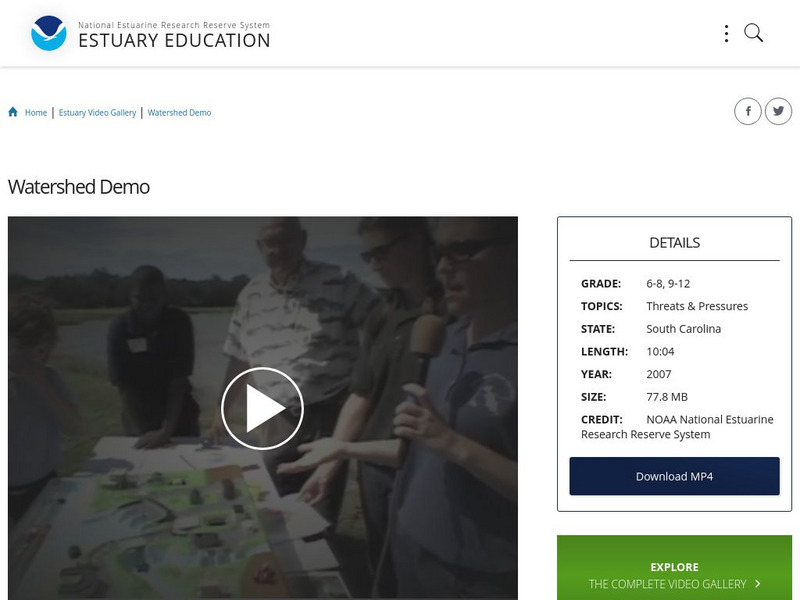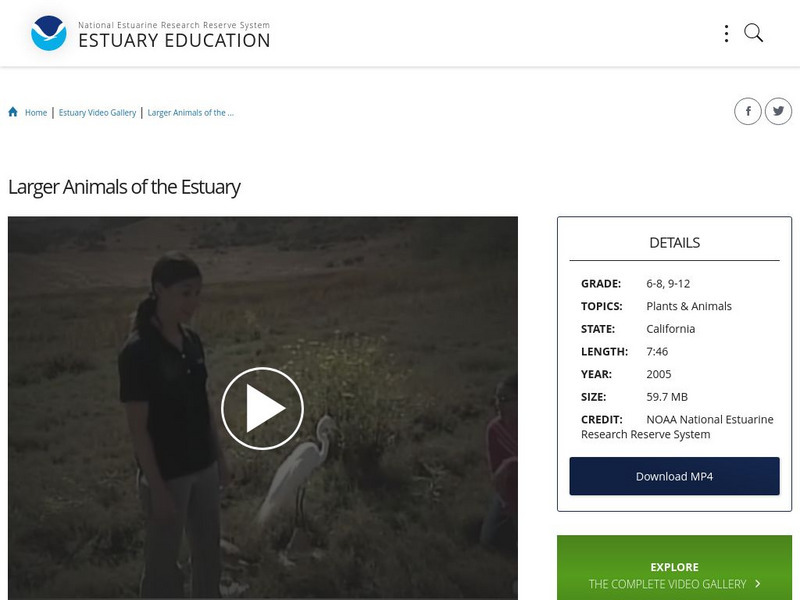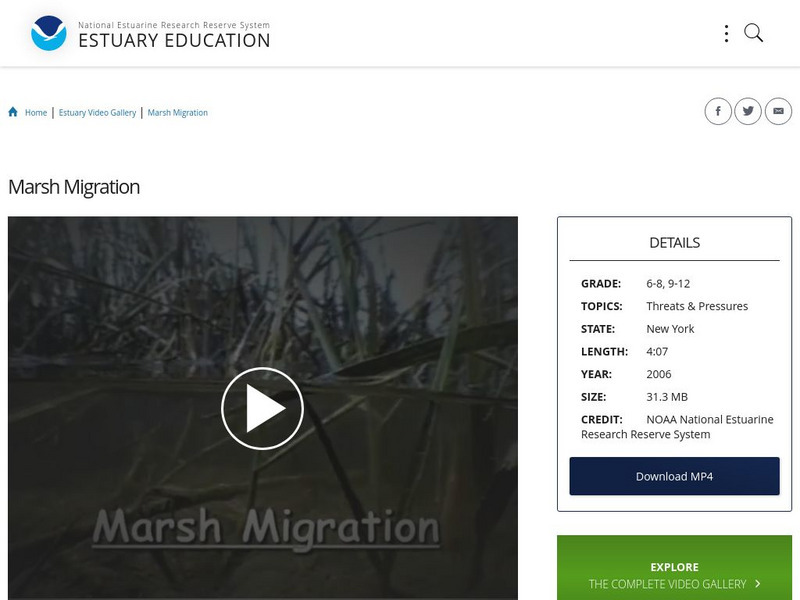Hi, what do you want to do?
NOAA
Noaa: Food, Water and Medicine From the Sea
This video explores the beneficial medicines, foods and water that can be obtained from the sea. Two enrichment activities are also available.
NOAA
Noaa: Living Ocean Gallery
This resource provides photographs or video clips of fish, sharks, eels or rays. Quick Time is required.
NOAA
Noaa: Seafloor
This resource provides photographs or video clips of the seafloor. The images are organized under the topics, geologic features, bacteria mats, hydrates and habitat. Quick Time is required.
NOAA
Noaa: Estuary Education: Urban Estuaries: Water Quality Testing
Students measure water quality in the NY-NJ Estuary using simple tools. Scientists explain the importance of good water quality and talk about what causes water quality declines. [5:44]
NOAA
Noaa: Estuary Education: Watershed Demo
A quick, by necessity, discussion of watersheds with a great demo using a very good watershed model (Enviroscape) plus a couple of student tips. [10:04]
NOAA
Noaa: Estuary Education: Plants (Circle of Life)
A segment from the film Waters of Life takes a look at the role of plants in the estuary, and the cycle of life that depends on them. [3:27]
NOAA
Noaa: Estuary Education: Oyster Research
Learn about different research techniques used to study the oyster population in the estuary. [5:55]
NOAA
Noaa: Estuary Education: Hermit Crab Research
A young researcher studies how hermit crabs live and reproduce in the estuary. She also discusses the value of the Estuarine Research Reserve system. [4:57]
NOAA
Noaa: Estuary Education: Night in the Estuary
Come along on a night hike exploring the Rachel Carson Reserve in Beaufort, North Carolina. Duke University's Dan Rittshof, an expert on the estuarine environment, discusses the blue crab species. [4:22]
NOAA
Noaa: Estuary Education: Weather Forecasting Technology
Join an NOAA scientist and learn how the National Weather Service forecasts the weather. Find out how meteorologists rely on observations, computer models, and advanced technology when determining a forecast. [7:13]
NOAA
Noaa: Estuary Education: Extreme Weather: Path of Destruction
Learn how the National Weather Service uses technology to forecast extreme weather events and issue warnings to citizens in the path of destruction. [9:14]
NOAA
Noaa: Estuary Education: Weather Radio: Emergency Warning System
Go behind the scenes of the NOAA Weather Radio system. Learn how the system goes about issuing storm watches and warnings to the community when severe weather approaches. [3:53]
NOAA
Noaa: Estuary Education: To Be a Meteorologist
See an interview with a high school senior who wants to study to become a meteorologist. She is working with her local National Weather Service office to find out what she will need to do to realize her dream. [3:00]
NOAA
Noaa: Estuary Education: Horseshoe Crabs
A close-up look at the horseshoe crab, an ancient estuary animal. [10:14]
NOAA
Noaa: Estuary Education: Red Drum Data
Collecting data on the much-prized Red Drum fish using standard data collection techniques. [10:12]
NOAA
Noaa: Estuary Education: Research Vessel Tour
Take a tour of the research vessel, the RV Palmetto, and find out about life and work aboard a scientific research boat. [10:12]
NOAA
Noaa: Estuary Education: Tornado: View From the Past
Weather forecasting has advanced since this film was made (in about 1956). Compare forecasting methods shown in this film with modern techniques. Watch for a huge mistake in the way scientists thought about tornado safety fifty years...
NOAA
Noaa: Estuary Education: Estuary Scavenger Hunt
Follow this group of students through their scavenger hunt in the estuary. Take a look at the living and nonliving things that make this ecosystem a special place. [9:38]
NOAA
Noaa: Estuary Education: China Camp State Park
California's China Camp State Park is an important environmental and historic site which has a natural watershed along the shores of San Francisco Bay. Features in the estuary include an extensive intertidal salt marsh, meadow, and oak...
NOAA
Noaa: Estuary Education: Eelgrass Restoration
Take a look at the scientific efforts to reseed the valuable but shrinking eelgrass bed habitats in the estuarine ecosystem. [3:06]
NOAA
Noaa: Estuary Education: Larger Animals of the Estuary
Join a naturalist who studies the large animals and native birds found in the estuarine areas. Spend the day exploring the San Francisco Bay Estuary with this group of students. [7:46]
NOAA
Noaa: Estuary Education: Restoring the Estuary
Students learn about the destructive effect invasive plants have on an estuarine ecosystem, and they get hands-on experience getting rid of these non-native species. [5:41]
NOAA
Noaa: Estuary Education: Wetlands: A Cautionary Tale
High School students perform a short skit describing the fragile nature of estuaries, while others demonstrate the value of wetlands using a water table. [3:10]
NOAA
Noaa: Estuary Education: Marsh Migration
Dr. Alex Kolker shows high school students how a salt marsh can actually migrate across the landscape. He uses fresh core samples taken by students to demonstrate his points. [4:04]



























